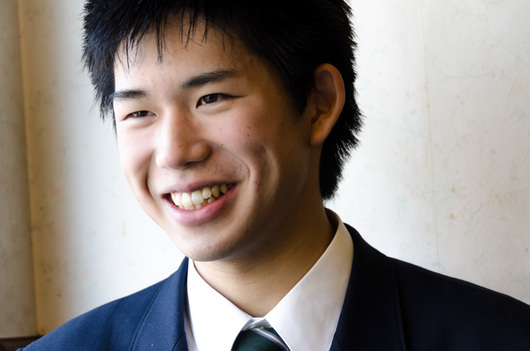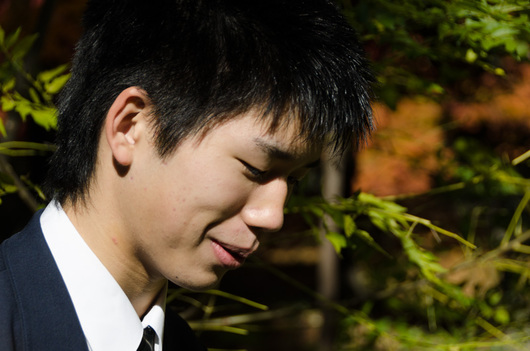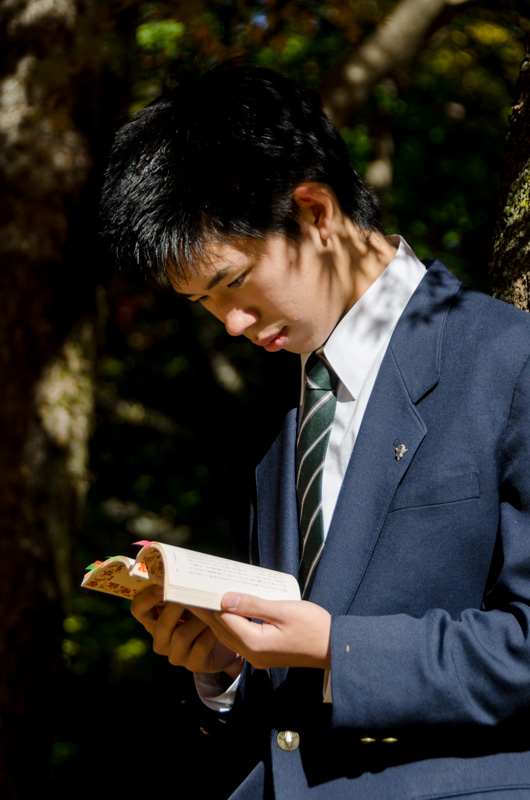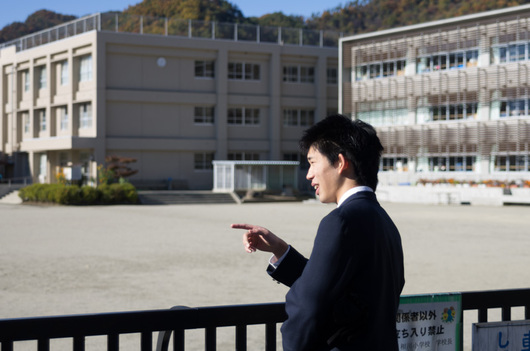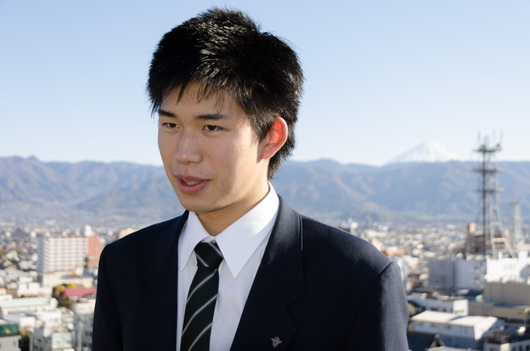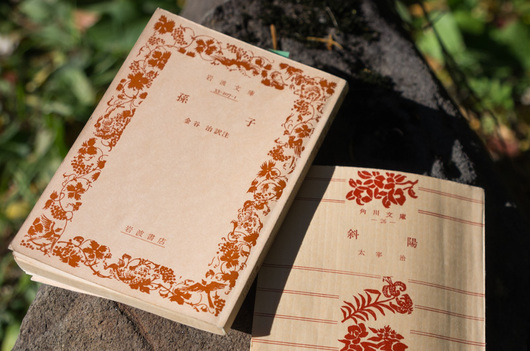The Power of Words
vol.1
Cutting Out a Piece of the Everyday
Bansho (2nd-year high school student, 17 years old, Yamanashi Prefecture)
2013.02
|
Bansho (2nd-year high school student, 17 years old, Yamanashi Prefecture) Bansho took first place in this year's high school "poetry boxing"* tournament at the All Japan High School Culture Festival** in August 2012. The contestants recited poems they had prepared ahead of time in the first and second rounds, but in the final round improvised a poem on a topic given to them by the judges on the spot. The topic given to Bansho was "Dam." The audience was awestruck when Bansho linked dams to the turmoil inside his heart. How does Bansho, a member of the literature club at his high school, engage with words from day to day? |
*The All Japan High School Culture Festival brings together participants from all over Japan and is aimed at encouraging creative activities and promoting mutual understanding among high school students. The festival features theater, handicrafts, local performing arts, and photography divisions, and is held annually under the sponsorship of such institutions as the Agency for Cultural Affairs.
**Poetry boxing is an event in which multiple people or teams perform poems on a stage set up like a boxing ring to see who can engage the audience more.
Japan Reading Boxing Association http://www.jrba.net/
Until I entered the poetry boxing competition, I'd actually never written poems. Usually, I write tanka and fiction.
I decided to compete in the poetry boxing competition after hearing about it from our advisor at the literature club and thinking it sounded fun. I've always been the type to start writing only once the pressure is on, and I struggled to compose my poems this time around, too. I finally wrote them on the day before the competition, and I reread and rewrote them on the train to Tokyo. I was editing them even after I got to the tournament site.
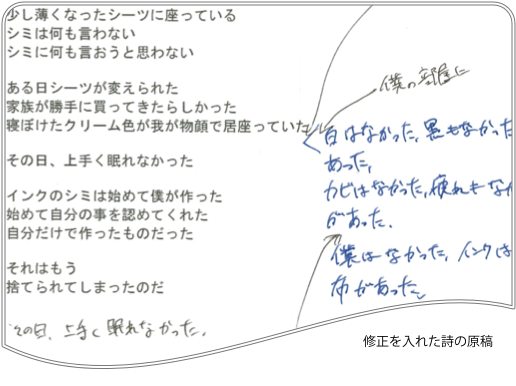
In the final round, the gong sounded as soon as tournament judge Kusunoki Katsunori said, "Your topic is: 'dam.'" What immediately popped into mind was the line from Tanikawa Shuntaro's lyrics for the chorus ensemble "In Spring" that goes, "Stemmed by the dam in my heart." I remembered it well because a lot of classes at my junior high school had sung it at our choir competitions. I decided I'd use this as a launching pad and recited the first line of my poem.
From there on, I repeated the process of instantaneously composing a long line in my head and condensing it, over and over. Afterwards, I had no recollection of the poem I'd recited. But when I read it over now, I'm impressed that I was actually able to create something like that (laughs).
Bansho delivers his improvised poem "Dam" in the ring at the Poetry boxing competition finals.
"Dam"
Someone said
My heart was blocked off by a dam
I looked inside me
There was no dam
There was only a puddle
I looked inside
Maybe it actually wasn't a puddle
But actually a much deeper hole
And maybe if I looked inside
There'd be something much, much deeper than a dam
I tried to look inside
I stopped
I was afraid to look inside
I was afraid of myself
I was merely trying to create a puddle inside me
I was afraid to look inside
I didn't want to look inside and admit
That I was really, truly just a puddle
I couldn't look at the puddle
If that really were me
If the puddle were one that wouldn't even dampen the bottom of a shoe
How could I go on?
With Poems, Anything Goes
Because I came in first at the All Japan High School Culture Festival's poetry boxing competition, I was given the opportunity to participate in the national poetry boxing competition held in October 2012 in Yokohama. Sixteen people who had won regional tournaments participated. There were two high school students including myself, and the others were adults.
Throughout the tournament, I was impressed by the other contestants' poems, and was struck by the power of poetry. I don't think that I'm capable of creating poetry like that at all. Of course, I wrote poems as a participant in the tournament, but to me, what I wrote doesn't constitute poetry. After all, I did lose in the first round of the nationals...
For me, I find writing poetry difficult because there's so much freedom in it. Rules on tanka dictate that they must have 31 characters, but with poetry, anything goes. If you were to think about it in terms of music, it's like being told to perform without a designated genre like rock of classical. If there's a set genre, like rock, then one could choose from within that genre, whether it be progressive or punk, and create a performance or write a song from there. I prefer freedom within a certain framework.
People who write poems that I think are amazing, though, create their own genres. I haven't been able to do that.
When I'm writing tanka or a poem, I first build a novel, or a story, in my head, and then take out the explanatory parts. In other words, if a novel is the whole, poems and tanka are what remain after I've taken a bunch of stuff out of it.
The shorter something gets, the more weight each word carries. Every word in tanka is heavy. But it's hard to determine weight in a poem.
Each Form Has its Appeal
Tanka involves putting the focus one thing, and layering on the things that surround it. But because they can only have 31 characters, you try to whittle everything down as much as possible. In novels, you have your focus, and everything that surrounds it, and you create a story that has an introduction, a development, a twist, and a conclusion.
I'd figured that a poem was something between tanka and novels. But recently, I've come to think that it's not in the middle, but rather somewhere completely out there. I'm still not really sure...
Tanka as a Part of Everyday Life
I started writing tanka and fiction after I joined the literature club in high school. At first I wasn't sure I could write tanka, but as it turns out, it's not that hard. I was the type to just start writing and then make improvements, instead of first learning how to write and the rules. My senpai often warn me not to get caught up in learning about tanka, and instead focus on the actual doing.
I often do this thing where I shuffle 100 cards with a word written on each, choose one, and compose tanka based on that word. Once I've done that, I remove the card from the pack, add another word to the set, and start over. There's a genre called sandai-banashi* in rakugo storytelling, and this is like a version of that. It's fun.
Writing tanka has helped me develop greater breadth in my language. At our club, we all write tanka based on a given topic, gather them up, and vote on the best one. We then critique all the work, talking about what's good and what's not about each one. Through such activities, I've been able to expand my vocabulary and eliminate superfluous expressions.
Now, whenever something happens, or even when I have nothing going on, I write tanka. It's become a part of my everyday life.
* A genre of rakugo storytelling in which audience members call out three topics, which the performer must then incorporate into a story on the spot.
What I Want to Express
I think there are tanka with elements of surprise and those without. For example, Ishikawa Takuboku's tanka below is an example of the latter:
On the white sand beach
Of a tiny island
In the Eastern Sea
Bathed in tears
I play with a crab
Meanwhile, the tanka below from one of my favorite tanka poets, Saito Saito, is an example of one with an element of surprise.
A rainy prefectural road
Walking along
What is that
Emptied out on the road
It's a nori-ben (a boxed meal consisting of a layer of rice covered in seaweed sheets)
"A lunch box with its contents dumped onto the road" is a surprising image, isn't it? I like both tanka, but I want to write those that startle the reader. I want to write tanka that skillfully combine dissimilar elements.
Expressing Reality as Is
I like Suga Shikao's lyrics a lot. It's common for songs to reach their climax with some guy confessing his love to a girl, but in Suga's songs, the guys are falling asleep on the last train after being dumped. To me, that's reality.
There's a tendency for the story to unfold too smoothly in novels, I think. Mysteries usually reveal who the culprit is, and in romances, characters might go through some tough times but reach a certain level of happiness. Elsewhere, the world, for the most part, is saved. But I feel really strongly that this isn't what reality is about.
I arrived at this way of thinking after reading an essay by an Akutagawa Prize-winning novelist when I was in junior high. The writer argued that because there are no tidy endings in reality there should none in novels, and that as soon as a story reaches a tidy ending, it becomes a lie...
I was shocked. It rang so true.
When a protagonist presses forward despite hardships, the positive attitude is coming from that person. It's not like the situation itself has changed for the better. That's why I want to portray things that are messy as messy, and negative situations as negative.
Discovering a New Me
Once I joined the literature club and started writing, I found unexpectedly that I was good at it (laughs). I also discovered that I'm pretty serious when I write. I'm usually not a serious guy. Whenever I talk to people, I want to say something funny. But I've won awards in writing contests for high school students, so I think I have something to show for my efforts (laughs).
Also, I've realized that I actually like to write.
As an Elementary School Student
When I think about it, I used to write a lot of book reports in elementary school, whether it was for homework, or because my parents made me. My mother would get mad at me if I didn't take them seriously, so I put a lot of effort into them. I think those reports helped me develop my writing skills. My parents also used to make me write summaries of short traditional comedy stories. I think those experiences comprised the foundations of my learning.
I often cried as I struggled through those reports, but that didn't turn me off from reading or writing. I guess you have to condemn the crime, not the criminal. In other words, condemn the reports, not the books. Condemn the reports, not my mother (laughs).
As Bansho walks around his former elementary school he says, "In my memories, the school was so much bigger..."
What Words Can Do
We have to communicate as we go through life, right? When there's something I want someone to understand, I use words because I want people to understand me 100 percent. It would be a shame to create unnecessary misunderstanding. There's not much you can do about disputes that arise in spite of smooth communication, but I think there's nothing as stupid as disputes that arise due to insufficient communication.
I see situations like that, of people criticizing each other without engaging in discussion...It's just ridiculous.
That's why I try to make sure that I communicate what I'm thinking.
My Dreams
A long-term dream of mine is to win a prize for a novel.
For now, my goal is to finish a long work of fiction. The longest work I've written to date is about 30 manuscript pages, or the equivalent of about 6,000 words in English, but I want to get to about 200 to 300 pages and am in the midst of writing. Once I finish this novel, though, I'm going to take a break for the remainder of high school. I'll focus on studying for the college entrance exams once I'm a third-year student. And then, when I'm in college, I'll start writing again.
My favorite books, "The Setting Sun" by Dazai Osamu, and "The Art of War" by Sun Tze, both of which I've read over and over again. In addition to the fact that I like Dazai's writing, I forget the beginning of the book by the time I finish it because it's so long, and I can read the book with a fresh outlook all over again. "The Art of War" says a lot of great things at the beginning, but I like the fact that it gets increasingly ridiculous and has punch lines.










